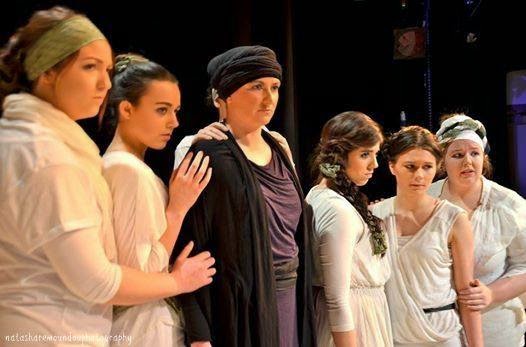The course of Electra has been many things, we’ve
explored the challenging aspects, the historical aspects and it must be said
the slightly wilder aspects. Approaching Greek text was strange at first,
something I hadn’t encountered before with regards to acting. It was necessary
for us to go above and beyond with this text in order to find what was at its
root and core. It was different to what we were all used to performing, more
heightened, more stylized so it evidently required intense examination.
Personally I found my journey with this text a
liberating one. Classical text is something I had little experience with and
being giving the opportunity to work as an ensemble and discover this text as a
group was extremely rewarding. There was a certain consciousness and
self-judgment you had to loose with this tragedy. You can only fight a text
like this to a certain extent before you succumb to the languages textures and
the stylized movements.
The more you committed yourself to this world, to these
characters reasoning and beliefs, the better understanding you acquired and the
deeper you were able to delve into the essence of the play. Beginning with
viewpoints exercises was brilliant. It helped us to release our inhibitions and
free ourselves from the confines of our minds. It also helped us to loose
some of the anticipated nervousness we had approaching a production of this
scale and also helped to get to know each other better. There’s a certain
extent you want to be comfortable with someone before you start groping their
face and randomly holding their hand on stage. But sure, when in Greece.
The interesting thing about Electra is that there was
something new to discover every week. A new inflection, a new staging, a new
nuance in a relationship, our Eureka moments were endless. We managed to keep
the show fresh, to bring our wide plethora of ideas together and expand them
under the intuitive guidance of our wonderful dramaturge Natasha.
We were
directed to find our own personal relationship in the text, to bring together
the nuances of our characters and to learn the tools in which one must draw
upon to develop another persona.
As expected production week was, of course, a
rollercoaster ride. There is always a
point in a show where you start wanting your props and stage, you’re craving to
take the play to the next level. Suddenly the show becomes new and experimental
all over again. There are things you realize you never noticed before,
inflections that unexpectedly work better and relationships that become more
defined. But it’s bringing it to an audience that is always the best bit. The
adrenaline and excitement that comes with your first performance is always
unforgettable. Your heart is in your mouth, you’re rooting for your cast
members and mentally preparing yourself to be ready is the most important thing in the world.
Being a character that was on stage for the majority of
the performance was both insightful and challenging. Under careful direction we
learned how to control and expel our energy for that amount of time with out
dialogue and along with that we got to see first hand the different nuances of
the show each night.
 |
| Niamh Ryan (center) with Jessica Watts and Emily Noctor Photo: Natasha Remoundou |
A
film is something that can capture a moment and relate the same moment again
and again each time. In theatre, once a moment happens it is somewhat lost
forever but that is merely where the preponderance of the excitement lies. You
can connect with your audience, invite them into your world, include them in
your experience and every night something new is found. No show is the same,
each night upon watching the rest of the cast there was a new impetus found in
the text, a facial expression or inflection that added even more depth to the
performance.
We were a very lucky cast in regards to the environment
we were given the opportunity to work in. Theatre rehearsals are often long,
stressful, wrinkle creating and social life destroying but Electra had a little
more. We all pulled together as a team and there was an imminent sense of
support and comradery through out the production. There was never a dull moment
in Electra. Each of us had the freedom to be ourselves and learn in a
comfortable and encouraging environment. Sometimes all the confidence you need
is in a Katy Perry jam. Overall, Electra was a thoroughly enjoyable show and luckily, we’ll have the chance to do
it all over again next week.
Niamh Ryan
 |
| The Chorus cheers on the murder of Clytemnestra. Photo: Natasha Remoundou *** |
Sophocles' Electra
in an adaptation by Frank McGuinness
Directed by Charlotte McIvor
RETURNS due to popular demand
Wednesday, March 19 and Thursday, March 20 at 8PM
Bailey Allen Hall
Tickets ON SALE now at the Socs Box.
Call 091 492852 to confirm availability.







_-_Tome_3.djvu.jpg)








